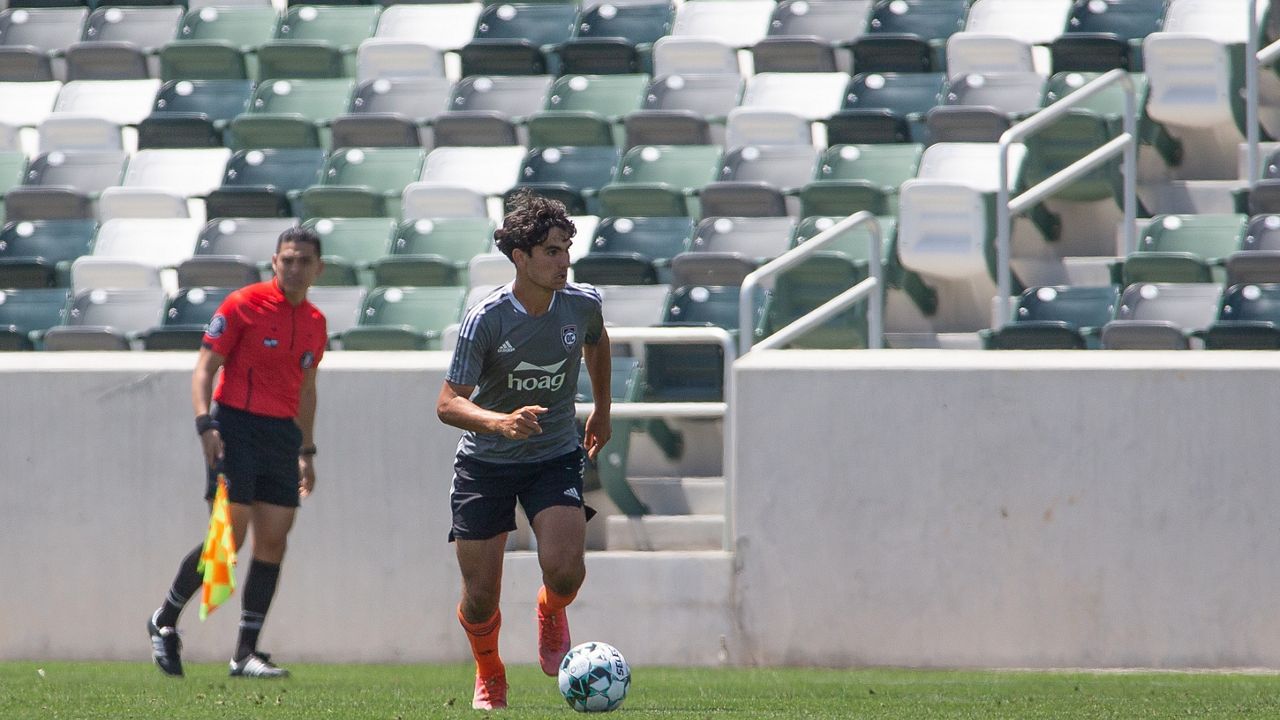ORANGE COUNTY, Calif. — Francis Jacobs is young. At just 14 years old, the Orange County Soccer Club midfielder was the youngest player signed to a professional soccer contract in U.S. history.
Jacobs' parents still drive him to practice once, sometimes twice a day, and his coaches have carefully balanced the needs of a teenager with the requirements of a professional athlete. Now 16, rumors have swirled over a potential transfer to a powerhouse club in Scotland.
In many ways, Jacobs represents the future, being a precocious student of the game with the right defensive and offensive instincts and a work ethic rare for a player his age. His team, which competes in the United Soccer League, thinks he can be an elite player — perhaps even the next best thing to come out of the U.S.
Most important is the financial value he brings to the club — not as a draw for non-existent TV deals but as a commodity to be sold to rich clubs overseas.
“If you can have a few of these every year then your return is going to be significant,” said Oliver Wyss, the team’s general manager and president of soccer operations.
Here’s how it works: OC Soccer Club develops young players like Jacobs and sells the rights to their contract for a transfer fee. But the second time he’s transferred is where the team could see real money. They’re hoping his value climbs enough for him to earn a contract in the tens of millions, of which they get a percentage.
Jacobs gets intensive development and training, and the club gets a nice return on its investment.
It’s the tried and true European model which has produced countless stars and provided many small clubs a way to sustain themselves. And Wyss is further developing his system in Southern California — what he considers a still largely untapped talent pool.
While there may be other players with Jacobs' raw ability, not all are identified and fast-tracked. Wyss said the best 16 and 17-year-olds aren’t playing with kids their own age but are competing with grown men on professional fields. His goal is to find more such players.
The team has started a soccer academy that allows players to train as professionals but maintains their eligibility should they decide to accept a scholarship to play in college.
It’s part of a vast network of players the organization is keeping tabs on. OC Soccer Club said its partnerships encompass about 2,000 players. And Wyss noted that building trust and deeper relationships with these teams is an immediate goal for the club. That includes the development of a financial relationship.
“If we get a player from a club and we’re profiting from that player, it’s only right to return some money to those nonprofits,” Wyss said.
The idea is to continue pumping resources into the lowest ranks in order to produce talent-rich youth leagues.
Interest in the game is already there. Soccer nationwide has steadily climbed in popularity with gains at every level. Attendance at Major League Soccer games, the nation’s best-paid, highest level of competition, has grown roughly 16% since 1996.
The league itself earns about $1 billion a year, or roughly one-thirtieth of what the NFL brings in annually. High school participation has even shot up. Boys’ participation went from approximately 658,000 to 853,000 between 2003 and 2019.
The results have been more players ready for the next level at earlier ages.
“People get a better education early, and we let them spread their wings,” said Yoss Raz, the head men’s soccer coach at the University of California, Irvine. “Parents just understand what it takes, and professional organizations are investing in grassroots programs.”
Players at UCI have sometimes left after one year to go pro, while others stay all four.
Soccer has long been an outlier among major sports leagues in the U.S., lacking the visibility and big contracts of sports like football, basketball and baseball. Slowly, the economics of soccer, the world’s most popular sport, are shifting in the country. Big-name stars from overseas like David Beckham and Zlatan Ibrahimovic have helped bring new excitement and attention.
But just as important are the up-and-coming players like Jacobs, who have given the minor league clubs stateside a valuable resource to sell.
OC Soccer club has already been successful. Last October, it transferred 18-year-old goaltender Aaron Cervantes to the Glasgow Rangers, a European powerhouse.
Jacobs could be heading there next. OC Soccer Club is affiliated with the Rangers, who have already seen him play on a youth team in their organization.
That kind of vote of confidence would be big for Jacobs and huge for the team that developed him. Wyss hopes it will help set OC Soccer Club apart as a premier development program worthy of talented young players across the globe.
If Jacobs elevates to the highest level of international play, then OC Soccer Club’s future could be secure for years to come.



